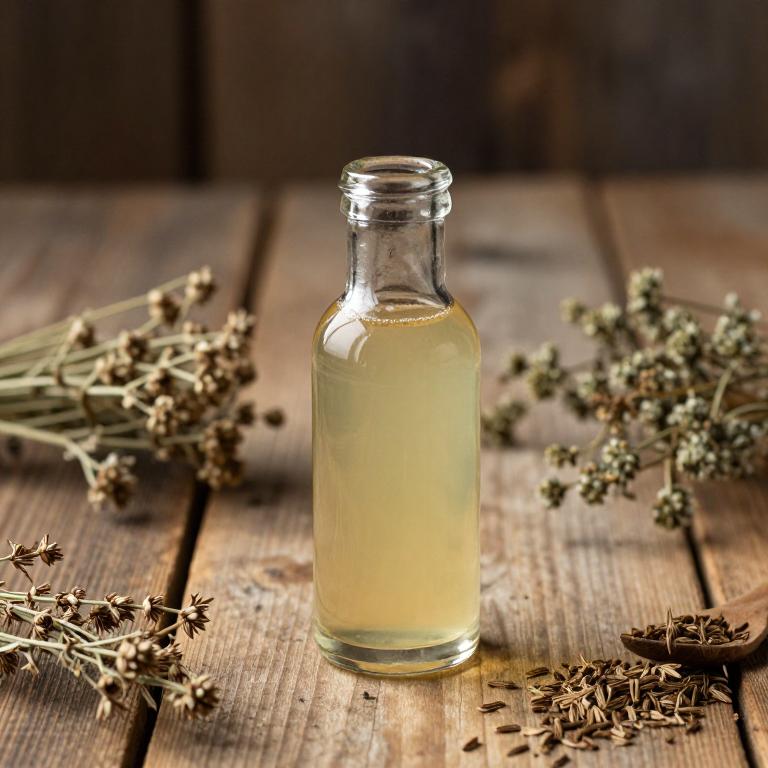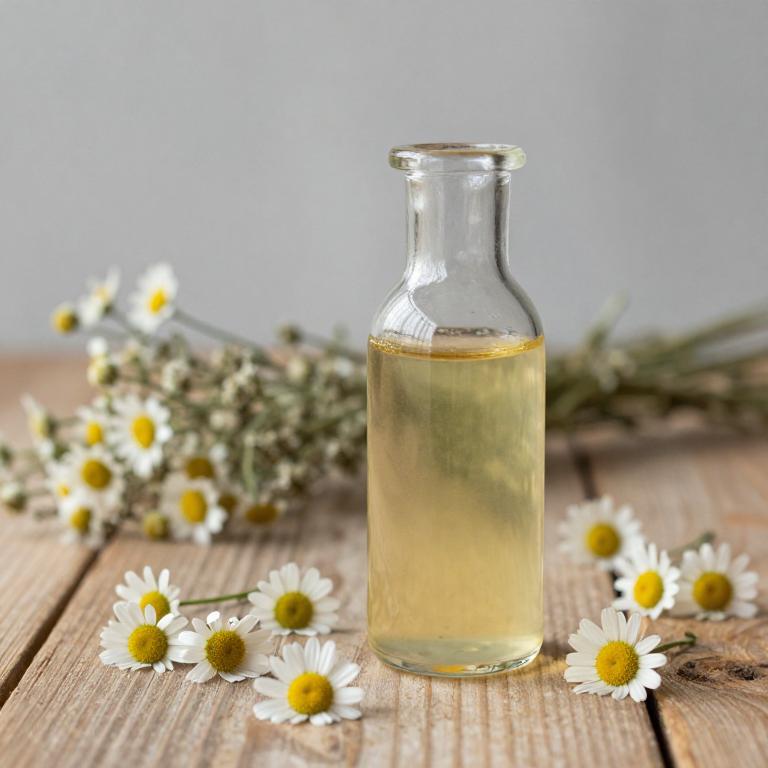10 Best Herbal Juices For Cramps

Herbal juices can be a natural and effective way to alleviate menstrual cramps by incorporating calming and anti-inflammatory ingredients such as ginger, turmeric, and chamomile.
These herbs are known for their ability to reduce pain and inflammation, making them beneficial for women experiencing discomfort during their menstrual cycle. A simple blend of fresh ginger and lemon juice can help soothe the digestive system and ease cramping, while turmeric juice provides potent anti-inflammatory properties. Chamomile, when consumed as a juice, can also help relax the muscles and promote a sense of calm.
To maximize their benefits, it's best to consume these herbal juices in their fresh, raw form, ideally on a daily basis during the menstrual cycle.
Table of Contents
- 1. Turmeric (Curcuma longa)
- 2. Fennel (Foeniculum vulgare)
- 3. Cumin (Cuminum cyminum)
- 4. Dog rose (Rosa canina)
- 5. Stinging nettle (Urtica dioica)
- 6. Ginger (Zingiber officinale)
- 7. Chaste tree (Vitex agnus-castus)
- 8. Peppermint (Mentha piperita)
- 9. Thistle (Silybum marianum)
- 10. Chamomile (Matricaria chamomilla)
1. Turmeric (Curcuma longa)

Curcuma longa, commonly known as turmeric, contains curcumin, a powerful compound with strong anti-inflammatory and antioxidant properties.
When consumed as a herbal juice, turmeric can help alleviate menstrual cramps by reducing inflammation and oxidative stress in the uterine lining. This natural remedy is often used in traditional medicine to ease pain and discomfort associated with dysmenorrhea. To prepare the juice, fresh turmeric root is typically blended with water, lemon juice, and sometimes black pepper to enhance absorption.
While generally safe, it is advisable to consult a healthcare professional before using turmeric juice, especially for those with existing health conditions or on medication.
2. Fennel (Foeniculum vulgare)

Foeniculum vulgare, commonly known as fennel, is a herb often used in the preparation of herbal juices to alleviate menstrual cramps and digestive discomfort.
The essential oils in fennel, particularly anethol, have antispasmodic properties that help relax the uterine muscles, reducing cramp intensity. When consumed as a juice, fennel can also support digestion and ease bloating, which are common symptoms during menstruation. To prepare fennel juice, fresh fennel bulbs are typically juiced with a bit of water or another mild juice for better taste.
Regular consumption of fennel juice may provide natural relief for women experiencing cramps, though it is advisable to consult a healthcare provider before starting any new herbal regimen.
3. Cumin (Cuminum cyminum)

Cuminum cyminum, commonly known as cumin, is a widely used herb that has been traditionally valued for its potential health benefits, including relief from cramps.
When consumed as a herbal juice, cumin can help soothe digestive discomfort and reduce menstrual cramps due to its carminative and anti-inflammatory properties. The essential oils in cumin, such as limonene and cineole, contribute to its effectiveness in easing muscle spasms and pain. To prepare cumin juice, fresh cumin seeds are typically ground and mixed with water or a mild fruit juice for better absorption.
Regular consumption of cumin juice may support overall digestive health and provide natural relief for various types of cramps.
4. Dog rose (Rosa canina)

Rosa canina, also known as rosehip, is a traditional herbal remedy that has been used for centuries to support women's health, particularly in alleviating menstrual cramps.
The juice extracted from its bright orange berries is rich in essential nutrients such as vitamin C, omega-3 fatty acids, and bioflavonoids, which contribute to its anti-inflammatory and pain-relieving properties. Rosa canina herbal juice is often recommended for its ability to reduce the severity and duration of menstrual cramps by promoting blood circulation and easing uterine muscle tension. Its natural composition makes it a gentle and safe alternative for those seeking non-pharmacological relief from period pain.
Incorporating rosa canina juice into a balanced diet can support overall hormonal balance and enhance general well-being during menstruation.
5. Stinging nettle (Urtica dioica)

Urtica dioica, commonly known as stinging nettle, has been traditionally used for its potential health benefits, including relief from menstrual cramps.
When prepared as a herbal juice, stinging nettle is believed to support hormonal balance and reduce inflammation, which can alleviate cramp symptoms. The juice is typically made by juicing fresh leaves, which are rich in nutrients like iron, calcium, and magnesium. Some studies suggest that the anti-inflammatory compounds in stinging nettle may help ease uterine contractions and discomfort.
However, it is important to consult with a healthcare provider before using stinging nettle juice, especially during pregnancy or if taking other medications.
6. Ginger (Zingiber officinale)

Zingiber officinale, commonly known as ginger, is a popular herbal remedy used to alleviate menstrual cramps due to its anti-inflammatory and analgesic properties.
Ginger juice, extracted directly from fresh ginger root, contains bioactive compounds like gingerol and shogaol that help reduce uterine contractions and ease pain. Consuming ginger juice in moderation can provide natural relief from cramps without the side effects associated with over-the-counter medications. It is often recommended to drink ginger juice warm, either on its own or mixed with honey or lemon for enhanced flavor and effectiveness.
However, individuals with gastrointestinal issues or on blood-thinning medications should consult a healthcare provider before using ginger juice regularly.
7. Chaste tree (Vitex agnus-castus)

Vitex agnus-castus, commonly known as chasteberry, has been traditionally used to support hormonal balance and alleviate menstrual cramps.
Herbal juices made from vitex can help regulate menstrual cycles and reduce the intensity of cramping by influencing progesterone levels in the body. These natural remedies are often favored by women seeking alternative treatments for dysmenorrhea without the side effects of pharmaceuticals. When consumed as part of a balanced herbal regimen, vitex juice may also ease premenstrual symptoms and promote overall reproductive health.
However, it is important to consult with a healthcare provider before incorporating vitex into one's wellness routine, especially for those with existing health conditions or taking other medications.
8. Peppermint (Mentha piperita)

Mentha piperita, commonly known as peppermint, is a widely used herb in herbal remedies for缓解 cramps, particularly in the digestive system.
Peppermint herbal juices are valued for their ability to relax smooth muscle tissue, which can help alleviate menstrual cramps and other types of abdominal discomfort. The active compounds in peppermint, such as menthol and other essential oils, have antispasmodic and analgesic properties that contribute to its effectiveness. These juices can be consumed directly or diluted with water to reduce their strong flavor and potential irritation.
Regular consumption of peppermint herbal juice may provide natural relief for individuals experiencing frequent or severe cramping.
9. Thistle (Silybum marianum)

Silybum marianum, also known as milk thistle, is a herbal remedy that has been traditionally used for its potential benefits in supporting liver health and reducing inflammation.
Some herbal juices containing silybum marianum may be marketed for their ability to alleviate menstrual cramps due to their anti-inflammatory and antioxidant properties. While there is limited scientific evidence directly linking silybum marianum to relief of cramps, some studies suggest that its compounds may help reduce oxidative stress and muscle spasms. It is important to consult with a healthcare provider before using such herbal juices, especially if you have underlying health conditions or are taking other medications.
As with any supplement, the quality and potency of the herbal juice can vary, so choosing a reputable brand is essential for safety and effectiveness.
10. Chamomile (Matricaria chamomilla)

Matricaria chamomilla, commonly known as chamomile, is a popular herbal remedy used to alleviate menstrual cramps due to its anti-inflammatory and antispasmodic properties.
Chamomile herbal juices, derived from the fresh or dried flowers of the plant, contain compounds like apigenin and bisabolol that help relax smooth muscle tissues and reduce pain. These juices are often consumed as a calming tea or diluted in water to ease discomfort during menstruation. Many women find relief from cramps by incorporating chamomile into their diet, either through direct consumption or in combination with other herbs.
However, it is important to consult with a healthcare provider before using chamomile, especially for those with allergies or taking medications.